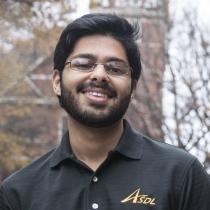
Sidharth Prem
What is your next adventure?
I'm going to do aviation safety data analysis for the Mitre Corporation in Washington, D.C.
What about your next adventure are you most looking forward to?
For me it's two things.
One is being able to be in a new place. One of the reasons I came to Tech [from New Jersey] was that I liked the change in the scenery and people. I've earned two degrees here, so I think it's time to see another place.
The other thing I'm excited about is continuing research in greater depth. I am interested in artificial intelligence and machine learning, and I think that might be a direction I'll take at Mitre. Part of the reason I feel so confident about branching out comes from the way Dr. Mavris boot-camped us. He threw us into problems that we'd never considered before. The Grand Challenge [research projects] that we did forced us to solve problems for clients. "Look at airport noise and see how populations are being affected." I didn't come into ASDL thinking that I would....but regardless of how much you know at the beginning of a project, there are common approaches to solving every problem.
Did you have any previous co-op, internship, or research experience in this area?
Research was the main reason I gravitated to ASDL. I got the chance to work on a few projects as an undergrad and a grad student. During my third year at Tech, there was a Grand Challenge for the US Navy. I had to code in Java to to create anti submarine warfare scenarios using agent-based modeling to ensure that we could take out enemy subs. That was one of my favorite ones. I also did some CFD research with Dr. Sankar that focused on testing airfoils and another Grand Challenge that involved an autonomously operated boat.
It's crazy because it's not just these separate research projects you are doing. It's all together. So you are doing the Grand Challenge with Dr. Mavris while you are also taking a class with him that has its own projects. You are constantly juggling the presentations you have to give the Grand Challenge CEO's -- they come at the end of the year -- while you are doing regular work.The nice thing is, that I might not remember everything I learned in a particular class, but I did learn how to reacquaint myself with it, what sources to check, how the right answer should look. Research teaches you how to tackle problems credibly.
How did your educational experience at GT-AE help you achieve that goal?
At Tech, you are not spoon-fed. Especially not at ASDL. You are given the freedom, but you must make that work for you. The school teaches you very quickly that you can't be passive, like you might have been in high school. On the other hand, you have research engineers and faculty with 10, 20, 30 years of experience doing research and working with sponsors, and that means a lot. And at ASDL, there is a community of people who know what you're first year is like. People like [research engineer] Michelle Kirby. She'd always help us change our scope, cut the problem up, so we could see it a little more clearly. Then she'd stand back and let you work it.
The other thing that was really great were the Grand Challenges. They are open-ended problems with no one right answer, so there's a lot to review. But, ultimately, you know that your customer will be using whatever you make, so you have to produce something they want. The Grand Challenge we did on airport noise required us to go way beyond traditional engineering problems. We had to talk to city councilmen, airport environmental engineers, the FAA, the airlines...there were a lot more moving parts. I had never expected to work on a problem like that and be interested in it. But I was. Regardless of the problem, problem-solving is always interesting.
What advice would you give to an underclassman who would like to follow the same path?
Don't passively wait around for an opportunity to do something -- especially things outside of aerospace engineering. And do things that are outside your comfort zone. All of those opportunities you have to jump on because they help you grow. You won't notice you were learning until you step back, after awhile, and see where you've gone.
For me, I've learned a lot about management, business, and event planning, because I've been president of the Buzzbeats, a student group that does beatboxing, a form of vocal percussion. I'd been a musician before and I'd been in chorus in high school, but this type of performing was way out of my comfort zone.